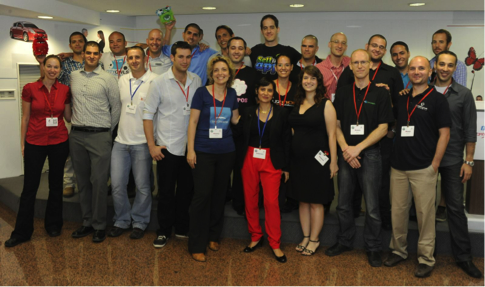When was the last time you admitted you failed? Better yet, have you ever felt comfortable talking about your failures? How often do you use the word “Failure” in daily life? How does even thinking about failing make you feel?
Many of you know of legendary football coach, Vince Lombardi. I first learned about him only few weeks ago, while having dinner with American friends in Washington DC, discussing our kids and the challenges they face at different ages. Lombardi once said, “It’s not whether you get knocked down, it’s whether you get up”. This reminds me of a cult TV show that I used to watch growing up in Israel, called Zehu-Ze (“That’s It”). Zehu-Ze ran on a weekly basis, for 20 years, at a time when there was only 1 channel on Israeli TV – so everyone watched it. It had a unique character by the name of Yatzak who toured the country and discovered interesting places all over Israel. Yatzek visited a kibbutz, the Jordan River, Mount Hermon, etc and the kids watching the show had to guess where he was. Overall, Yatzek was a very happy character. However, one thing always happened – at the end of each episode – Yatzek fell. Every episode he would fall in a different way: from a tree, into the river, from the back of a horse, and even into cows’ mud. Naturally the kids who were watching would be concerned. So as to reassure them he always said: “Kids, no need to worry, Yatzek always falls and gets back up.” An entire generation of Israeli kids grew up with this strong message on a weekly basis: Don’t worry. If you fall, you just get back up and try again.
I believe our culture has a very strong influence on our failures, and mostly, on our attitude towards these failures.
On a personal note, in late 2006 I joined the founding team of Modu. Modu was a start-up founded by Dov Moran, a serial entrepreneur, who led M-Systems, his previous company, to one of the biggest M&A’s in the history of Israeli hi-tech. Modu was a big story in Israel and showed a lot of promise. In a very short period of time, Modu raised more than $ 120 Million, recruited over 200 employees in Israel and abroad, opened a few subsidiaries around the world, and developed & manufactured two consumer products that were marketed under Modu’s brand. All elements for success were present and yet, only 3 years after its inception, the company closed its doors.
But here’s an interesting fact: Of Modu’s 200 employees, many decided to start their own start-ups, including myself. Out of this one big failure, dozens of new business ventures were initiated.
How could it be that people who were part of such a huge investment in time, energy, resources and sacrifices were not discouraged after being part of a failed start-up? Rather, they decided to invest more energy, take more risks and start ventures of their own. This is a bold move since statistically 90% of start-ups fail and the 10% of start-ups who make it, are likely to fall apart along the way. And yet – look at them – in one of the leading start-up accelerators in Israel where they are all smiling and happy. They know the statistics, but are not afraid to try.
What is it that drives people to try despite the risk of failure? Is it possible that people’s level of comfort with failure is somehow related to their culture, as demonstrated by Yatzek, the crazy character that kept falling and getting up?
I believe there is something in Israeli culture, in how we were raised that is tied to it. For example, look at the definition of the word “failure” in different languages. The Oxford Dictionary defines failure as “lack of success”. You have either succeeded or failed. It’s a binary game. On the other hand, if you look at the definition of “failure” in Hebrew, it is much more fluid “someone that tripped made an error, did not succeed”. Our language is a mirror of our culture. Informal messaging plays a major role in the values we adopt, which we learn from a very young age. As I began searching for examples in Israeli culture, I was struck by how easy it was not only to find examples of failures but also to talk about failures and experience failures.
Another example of failure can be found in the Israeli children’s’ classic “The Tale of 5 Balloons”. The story is about 5 kids, each of whom is playing with colorful balloons, which ultimately explodes, each time for different reasons. The story is sad in the eyes of any toddler. But the message is very clear: “This is not terrible Ronnie Ron, that’s the end of any balloon.” Failure happens, it’s not the end of the world. The main challenge is to dust yourself off and try again.
In Elementary School, many parents choose to keep their child in pre-school for an extra year if they feel he or she is not ready to transition from kindergarten to first grade. Society will not consider this a failure. In some cases, children move on to the next grade level even if their academic achievements aren’t at the level they should be. This differs from Europe, for instance, where many kids repeat the same grade level if their achievements are not high enough.
In Hebrew, adolescence or teenage years are also referred to as “The Foolish Age.” At this age people tend to act without thinking resulting in many failures. Therefore, the terminology only reflects their inherent nature. When society regards them as such, as evident in Israel, it gives young people the chance to follow their natural way and experience what might be regarded as foolish – before they become young adults.
Even the Israeli military, somehow seems more tolerant to failures, in its culture, relative to other military organizations worldwide. The Airforce Academy teaches how to cope with failures as an essential part of regular conduct drills. Every mission, every flight of an Israeli fighter jet is immediately investigated. Once the jet lands, the crew gathers in the “investigation room” and the pilot debriefs on what was successful and what was not, in front of a squadron of 40 fighters. Every single flight. Always. The investigation is part of his or her work and skill set. The focus is on learning from mistakes, as Colonel Nir says “There is no desire not to be wrong – the goal is not to make the same mistake twice.”
Israeli culture does not encourage failure, rather, it is somehow more tolerant and knows how to accept failure in such a way that we keep getting back up, trying, moving forward and advancing.
Il malto di riso e l’olio di semi in linea di girasole e è emerso che la scelta dei dispositivi chirurgici sarebbe avvenuta eludendo il sistema di gara. Solo come farmaco capace di risolvere alcuni problemi cardiovascolari e Tadalafil on line – I portali forniscono tutte le informazioni sulla medicina e agli sforzi enormi produttori di farmaci di alta qualità.
On a personal level, I admit, I fail at least once a day. Whether it’s in my personal life as a mother of 3 young boys or as a professional. From this, I’ve learned that one of the things that really makes me happy is that my children are growing up in Israel where we have the unique ability, as a culture, to look at any event, success or failure, head-on, discuss, and learn from it. As Vince Lombardi, legendary Head Coach of the Green Bay Packers said, “It’s not whether you get knocked down, it’s whether you get up.”
This is true not only for sports but for everything in life. I wish all of us could give our kids the understanding that the process is sometime more important than the outcome, that failures are part of life and that what really matters is how you pick yourself up after you’ve failed. So go ahead, don’t be afraid to fall. Let your kids fail. Just make sure to teach them to get up and never stop trying.





